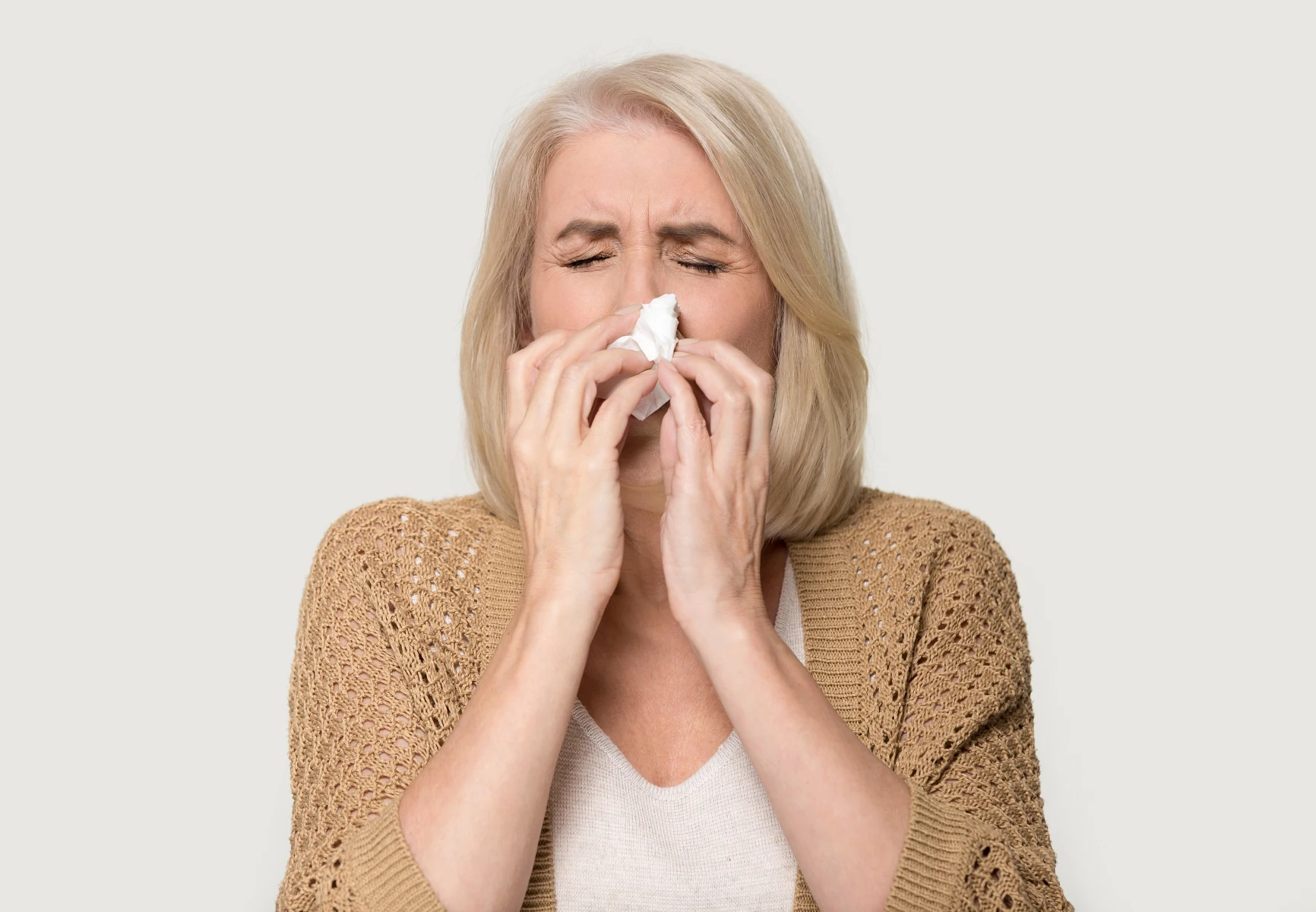Dr. Shawn Allen has either authored or reviewed and approved this content.
Page Updated:Postnasal drip can be uncomfortable and frustrating, and it’s a common cause of symptoms such as cough, sore throat, and hoarseness. While many may find relief from postnasal drip symptoms with over-the-counter remedies, postnasal drip that is chronic or long-lasting could be caused by a nasal condition that requires attention from a fellowship-trained sinus specialist.
Serving patients across Houston, The Woodlands, and surrounding areas, Dr. Shawn Allen provides advanced diagnostics and treatment options tailored to the root cause of your postnasal drip symptoms.

Postnasal drip occurs when excess mucus accumulates in the nasal passages and drains into the throat, leading to irritation. Mucus plays a protective role—moisturizing nasal tissues, filtering airborne particles, and fighting infection. Normally, you swallow this mucus unconsciously throughout the day.
However, when mucus becomes thick, excessive, or persistent, it becomes noticeable—causing throat clearing, coughing, or the sensation of mucus “sticking” in your throat. This is commonly referred to as postnasal drip.

Common symptoms of postnasal drip include:
Various conditions can cause chronic nasal drip. Common causes of postnasal drip include:
Diagnosing postnasal drip requires more than a basic physical exam. Dr. Allen uses advanced tools to identify the root cause:
Dr. Allen will create a personalized treatment plan based on the findings, helping you move from chronic symptoms to lasting relief.

Treatment of clear nasal drip is dependent upon the cause of the condition.
The nasal septum is made up of bone and cartilage with overlying mucosa and divides the two nasal cavities. When the septum is significantly deviated (crooked), Dr. Allen can perform a septoplasty to straighten and correct its shape, restoring normal airflow and function when needed.
Treatment of sinus infections may include decongestants, antihistamines, nasal saline irrigation, steroid nasal sprays, antibiotics, and other medications. In cases where chronic sinusitis does not respond to medications, Dr. Allen may perform surgery. Surgical treatment of chronic sinusitis may include septoplasty as well as endoscopic sinus surgery.
This in-office procedure is performed to dilate the sinuses, allowing Dr. Allen to rinse them and clear them of debris while improving their drainage and function.
Learn More About In-Office Balloon Sinuplasty
During endoscopic sinus surgery, Dr. Allen is able to enlarge the sinus openings, clear nasal obstructions such as polyps, and create a more favorable environment for the application of topical sinus medications.
Learn More About Endoscopic Sinus Surgery
Turbinates are structures inside the nasal passages that cleanse, warm, and humidify air breathed through the nose. When enlarged turbinates cause nasal obstruction or chronic congestion, inferior turbinate reduction (turbinoplasty) can significantly improve nasal airflow.
Learn More About Inferior Turbinate Reduction
In cases where allergies cause postnasal drip, treatment may include allergy pills, allergy shots or drops (immunotherapy), antihistamine nasal sprays, decongestants, and/or nasal or oral steroids.
When a bacterial infection causes postnasal drip, antibiotics are prescribed. Additional treatment may include saline nasal irrigation, decongestants, and/or nasal spray. When these medical treatments fail, surgery may be required to clear chronic infections.
When postnasal drip becomes more than an occasional nuisance, specialist care matters. Patients choose Dr. Shawn Allen and Premier Sinus because:
Whether your symptoms are mild or persistent, our team is here to help you breathe, speak, and feel better, day and night.
Not always, but it can significantly impact your quality of life when it becomes chronic. It may also signal underlying issues like sinusitis, allergies, or reflux, which should be properly addressed.
Yes. Perennial allergic rhinitis, often caused by indoor allergens like dust mites or pet dander, can lead to year-round postnasal drip symptoms.
Postnasal drip often causes a scratchy throat that worsens when lying down, along with throat clearing, a runny nose, or a “tickle” in the back of the throat. A sore throat from infection usually comes with other signs like fever or swollen glands.
Yes. Excess mucus in the throat can attract bacteria that cause halitosis (bad breath). Treating the underlying cause can improve both your symptoms and breath.

If you’re struggling with ongoing throat clearing, cough, or mucus in your throat, don’t ignore it. Dr. Shawn Allen is one of Houston’s most experienced sinus specialists, offering compassionate care backed by advanced training in minimally invasive nasal and sinus surgery.
Schedule a consultation to start your path to relief today.
Dr. Shawn Allen has either authored or reviewed and approved this content.
Page Updated: